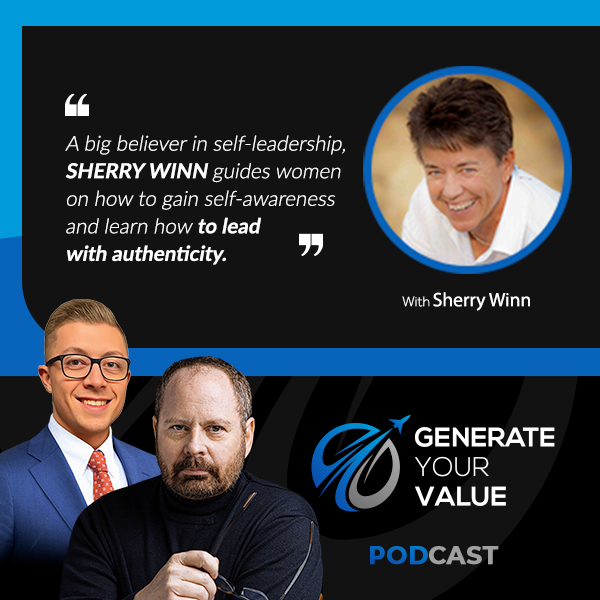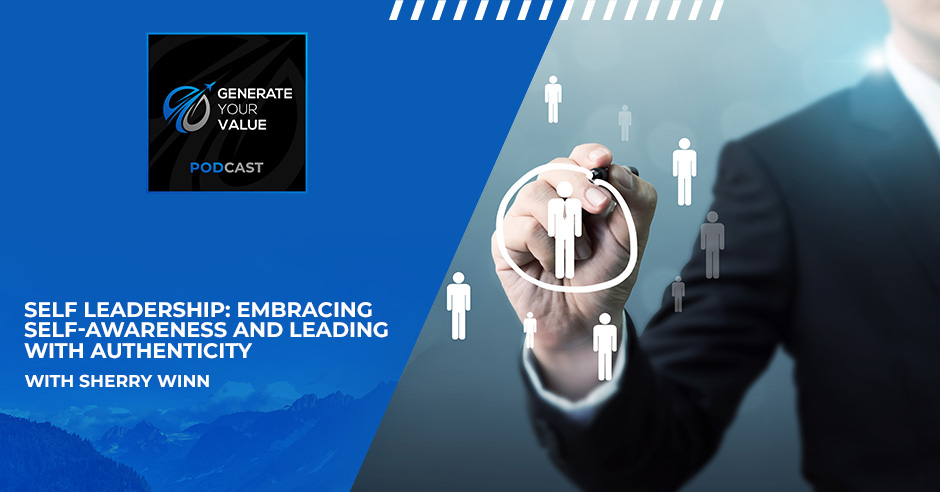True leadership begins by leading yourself—embracing self-awareness, understanding your worth, and communicating with assertiveness, not aggression. In this episode, Sherry Winn, a former Olympian, a coach, and a best-selling author, discusses what it takes to be a truly powerful leader. Through her journey, she brings to light the concept of self-actualization, where you become the best version of yourself and transcend the need for external validation. Sherry emphasizes the importance of understanding your own strengths and weaknesses, taking ownership of your self-improvement, and creating a culture of open communication. She explains the difference between assertive and aggressive communication, the significance of self-awareness, and how this journey ultimately leads to a happier, more productive life. Join us in learning how to grow, not only in your career but in every aspect of your life!
—
Listen to the podcast here
Self Leadership: Embracing Self-Awareness And Leading With Authenticity With Sherry Winn
Andy, this is Season 4. This is new, weird, and awesome all at the same time.
Constant improvement, that’s the name of the game. We are always trying to generate value in people’s lives. We kept getting poked in the side going, “When are you guys going to do an episode?” It’s like, “Here we go. Buckle up.” We have got a wonderful guest for you. She and I have an Olympic connection, which we will get into. Our guest now is Sherry Winn. She is the CEO and Founder of The Winning Leadership Company founded in 2013. Her company is renowned for starting an absolute revolution in leadership. Sherry’s team of legendary consultants is guaranteed to bring out the best in your top leaders and make up-and-coming leaders operate at championship levels.
Sherry knows how to cultivate Olympic minor leaders who motivate their teams to be engaged, productive, and loyal beyond measure. She’s an internationally claimed speaker who has spoken to 14,000 people at a time. She has spoken to such clients as Hitachi, Edward Jones, Adobe, Dell, and Anytime Fitness. She’s a two-time Olympian national championship basketball coach and author of three bestselling books. The latest that just came out is titled Winning Leadership: Seven Secrets to Being a Truly Powerful Leader – Finding and Keeping the Best People While Building a Loyal Team of Champions. Sherry, welcome to the show.
Thank you. I’m excited to be here. This is going to be fun
Sherry, we appreciate you hopping on and being here with us. First question for you, you told us life has not been all roses for you, particularly in your youth. Would you be willing to tell our audience what challenges you faced in your youth and what you learned from those experiences?

First of all, everybody faces challenges. It’s the human experience. Our level of challenges may be different per person, but for you, it’s real. It doesn’t matter. Sometimes I listen to other people’s experiences, and I’m like, “It was horrible.” I relay some of mine and they are like, “Oh.” We have to understand that everybody has those challenges. There are so many things that happened to me in a short amount of time, and it’s the stacking of experiences that hurts us. An isolated event doesn’t feel too bad, but we have a stacked level of events it’s what causes that pain to get bigger. I understand why people would get to that suicidal state because I was certainly there.
It came from the stacking of how it started as people not liking me. I was a good athlete, and sometimes when you are a good athlete, you get people who don’t like you, especially when it’s in your community and it’s you versus somebody else’s child. That started happening at a mean rate. When I was playing softball, for example, I had to be escorted off the field by policemen because the fans were so ugly and so mean. Nasty stuff. My teammates booed against me when I was the MVP of a basketball tournament.
You start developing this thing that people don’t like you and you feel betrayed and hurt in certain ways. My mom was my softball coach, but at age seventeen, she started dating one of our teammates. I didn’t know they were dating, which was strange. She was 40, the other was 17. What I thought was she didn’t like me, that my mother had abandoned me for this other kid. I didn’t understand that there was another dynamic, which still once I got that, it was messed up.
I felt like I was not liked, betrayed, and not even liked by my mom. That message kept getting hit again and again in certain ways. When I was in college, this thing happened with my teammates. Part of it is as I grew into this idea that people didn’t like me, I started separating myself from people, which made them think I didn’t like them. I perpetuated part of the problem, but in college, it happened again when my teammates went to the coach and said, “We don’t want to play with Sherry. She’s not a likable person.” As those things stacked up, I started feeling like I wasn’t worthy. I started feeling that I shouldn’t even be here. People didn’t like me. I shouldn’t even be here.
That’s where the depression, the drinking, and the suicidal thoughts came in. It was one event after another that became so big. It culminated in 1988 at the Olympic Games when my coach sexually harassed me. I told my teammates, and their response was, “Don’t tell anybody. You got to suck it up.” Those things, as they stack, get bigger and bigger until you are like, “I’m not worth living. I need to end it all.” I didn’t. I’m here.
Everybody faces challenges. It’s the human experience.
Even though you were having difficulties with teammates, did you find that a distraction or a home for you where you could find some worth? You are bringing your skills and talents to bear in the game and the sport even though your teammates may not have been on board with you. Did you find some home, value, or something of that nature through your talents and skills in sports?
Sports are a great thing because it’s a great outlet. I could be in the gym and train by myself for hours and be happy when a ball went in the basket and when I knew I was good, and feel that satisfaction of sweat rolling down my body. There were moments of greatness. I’m hitting the low points, but when I could look back, I saw there were certain people on my team who were great teammates. There were certain people who elevated me. There were a couple of coaches throughout my career that were phenomenal and they were very supportive. When I got angry, you could be good at sports when you are angry because you’d take it out on your opponent.
The sports were great. Looking back, I don’t blame my coaches or my teammates as much as to understand my part in all that. They have to own their part like their jealousy. They can own that. I can own my part. I can own that it was hard to be my teammate when I felt I was going to get betrayed. How do you act in those moments? I can own that. Sports were certainly a great avenue for a lot of different growth. Even looking back, what was my part? How can I take ownership of that? How can I grow? What were my controllable factors? I would encourage everybody to play sports.
It is focusing on you and the high points more so.
It is focusing and learning what my controllable factors were. Some of my teammates were great. I had great teammates in ‘84. They were wonderful people who were honest and yet empathetic. Incredible teammates there. I started reading personal help books by the dozens. It is understanding my part and understanding how I could focus on the controllable factors. The power that I had versus giving my power away to my coaches or teammates, a lot of that came into play as well.
Can you talk a little bit about your transition from basketball to handball? Did it fall into your lap or did somebody push you in that direction making that connection for you? How did that happen?
This is what’s so interesting. When people say when God closes one door or one door is closed for you, you know that door is closed because you wanted something else. You couldn’t get to one place without the other place closing. When I was a sophomore in college and all this happened with my teammates, my coach took me down the locker room and she went to the team, “Tell Sherry what you think about her.” They unleashed. I already had low self-esteem as you can imagine, and so I couldn’t handle that and so I said, “I quit.” I walked out the door and I started drinking. That was my next thing to do.
I’m like, “I will drink this away.” We will drink it all away and it will be better. That didn’t work. What happened was that one of my classmates said, “There’s this great club sport we are playing. It’s called handball.” I’m like, “I don’t even like racquetball.” She goes, “No. It’s European handball. You play on a court like a basketball court. It’s 40 feet longer and 20 feet wider. The ball looks like a miniature soccer ball, and the goal looks like a miniature soccer goal, and you throw the ball into the goal.” She said, “You get to hit people.” I go, “What? I get to hit people?”
She’s like, “Yes.” I said, “Okay.” They had a club team. I had nothing else to do. I started playing with the club team and I played club for about two months. They said, “We are going to go to New York City to the national tournament. Do you want to go?” I’m like, “Sure. I’m not doing anything else. I have nothing else in my life. I will go.”
When I was there, the national team coach was searching for new athletes to play on the national team. Since I had athleticism, he’s like, “Do you want to do this?” I’m like, “Yes. Are we going to be training for the ‘84 Olympic Games? Do I have a chance to be in the ‘84 Olympics?” “Yes.” It was one of those lessons that you learned that sometimes something needs to be closed off so that the thing you want is open to you, and so that was a great lesson for me.
When did you catch the coaching bug?
I wanted to be a coach ever since I wanted to be an athlete. It was consistent because I knew things. What I have discovered as a player is I know things that coaches didn’t even know. I felt the game in a way that I knew when an offense should be changed or defense should be changed, or somebody should be substituted. I just knew those things innately. When I was an athlete, every single day, I’d come home from practice beginning with college. Throughout my Olympic career, I’d write down every single practice that we had.
I had a journal and I’d write down every single drill we did and I’d evaluate the drill like, “This was a dumb drill. This was a good drill. This is why it was a good drill. This is why this drill should never be rerun.” I did that every single day. If you can imagine two years of college and then I quit to be an Olympian, that was another seven and a half years of doing that. I’d always evaluated practices and how they could have been better. Even when I was playing, I was still thinking about coaching.
Why do you feel that sports is such a great teacher of leadership and being that team player alongside leadership?
Like anything, you can have bad experiences or you can have good experiences. If you know that you can turn the bad experiences into learning opportunities, it’s still a good experience. I learned that through my coaching, my idea was, “How can I impact these young women in such a way they would elevate their lives forever? How can I do that?” It was intentional to teach them how to be good leaders. It was intentional to teach them how to be a good team member. It was intentional to give them life skills like how to resolve conflicts and how to become better communicators.
If you know that you can turn the bad experiences into learning opportunities, then that is still a good experience.
Those were intentional training that we did to develop our players beyond the court. What I learned was if you want to be a great leader, you can’t say, “I’m leading by example and people are through osmosis and are going to get what I’m doing.” You have to be intentional about what you are teaching to people. If you are intentional, many people will get it. Not everybody but many people will get it.
It’s like wanting to build an effective team.
In my last book, Winning Leadership: Seven Secrets to Being a Truly Powerful Leader, I asked the question to over 200 people, “What was your greatest challenge?” Over 80% of them said, “Myself.” That was their answer. I knew those were good leaders because they understood that, “For me to be the best I can be, I need to get who I am and I need to uncover my weaknesses as well as my strengths. I need to know those.”
When I have a weakness, there are two things you can do. Is this weakness important that I improve it or is this a weakness that I can delegate to somebody else? You have to get that. It always starts at that place. Also, are you willing to be a lifelong learner? Are you willing to always learn the next thing? Sometimes people will say, “You don’t understand that I’m 55 and I have a PhD. I have been doing this for 30 years.” Great.
What I want to tell people is if they are willing to learn or be self-aware and always uncover that next level. People go, “I know myself. I have been living with myself.” I’m like, “I know myself and I’m still discovering things I didn’t know. I’m still unraveling stuff. I’m like, ‘Are you serious that I do that?’” I’m still uncovering that because when we live with ourselves, we don’t know. We can’t see. We are just seeing the pieces we want to see and then we are sticking our head in the sand. We numb ourselves out so much.

Think about how the average person numbs themselves with television, scrolling through their phone, eating, drinking, and over-exercising. How do we numb ourselves and are we present with who we are? When we get to those things, we can uncover so many incredible ways to advance and become better individuals because you can’t give what you don’t have. To give more, you have got to have more.
It speaks to the importance of being present when you are in your relationships, whether they be people that you are leading or people in your personal life because it’s those relationships that are holding up the mirror to show you things about yourself that you didn’t even realize, as well as the power of tools like the 360 review that you can do to truly understand or uncover the things you are not aware that you are doing that are having an impact on people that you might need to do some work on.
It takes a true leader to do this self-introspection because, for most people, it’s terrifying.
It’s because we are afraid of what we are going to see or what we are going to hear. In the 360 review, you are like, “What will people say about me?” This is just information. It’s not somebody trying to tear you down, and if they are, that’s them. It’s not you. This is information to help me get better. This is all it is. When I was a player, I thought I had great information to share. Whether that was true or not, I don’t know, but I thought.
What I did with my players is I let them evaluate me. They would write an evaluation down. We had certain questions we’d ask, and after that, I would sit down with them one-on-one, and I’d go through them and I’d say, “Tell me more about this.” What they learned was I wasn’t going to retaliate. I wasn’t going to seek revenge. I wasn’t going to get mad. I wanted to know what they were thinking.
Some of those people I knew, “No. This is not true.” That’s their viewpoint and they are convoluted, but some people, if I had 8 or 9 people saying the same thing, I’m like, “I need to change. I need to evolve.” Learning that was important. If you are going to write a book, you are going to have critics. If you are going to coach a game, 50% of the people in the stands think you are an idiot. If you listen to the people that make sense, you can evaluate that. Is this good feedback or is it a criticism? Having that is important and your ability to grow comes through those honest conversations or the honest feedback that you get from people.

My last question in doing an annual performance review was always, “How can I be a better leader for you?” It may be a communication issue, a training issue, or I don’t have the right tools to do my job effectively. I may need A, B, and C that would help me speed up my productivity or whatever that I’m not aware of because I’m not sitting in my seat and doing my job. I know what at a high level what they are doing, but I’m not in the day-to-day or minute-to-minute thing like they are. As you said, it’s data points and facts. If you hear this repeated over and over again as you are going through the reviews, you have a serious issue that needs to be dealt with, whether it’s pointed at this guy here or it’s pointed at tools, training, or something else that needs to be done.
I always encourage the 360 review. I always encourage leaders with their immediate team members and their direct reports. Get their feedback continuously, so they know that they can give it to you and they can bring that to you so that you can make changes fast when they need to be changed, rather than having people suffer for 6 months or 1 year which affects productivity, engagement, and retention levels. This comes from confidence. That’s your ability to do the self-awareness. It comes from your confidence to know that you are a good person or a leader even if there are things you still need to work on. It’s very important to note.

We heard about the internal stuff for a leader in building a team. What other imperatives do you feel a leader needs to do besides introspection and making sure your leadership is on point?
Things that people talk about are communication. How do you communicate with other people? A lot of companies will say, “We do the one-on-one meetings, town halls, and skip meetings. We do team meetings on a regular basis and staff meetings.” That’s great, but how you do them is the important thing. Not just doing them. What I have discovered is that a lot of people say things like, “My door is always open. People can walk in my door anytime they want to.” “Great, but once they walk through your door, are you able to have that conversation?”
A lot of people lack good assertive communication skills. They don’t know how to do them. When I talk about this, a lot of people go, “We have way too many assertive communicators.” I’m like, “You don’t know what assertive communication is.” The way you are reacting now is you are confusing being an assertive communicator with an aggressive communicator.
What we have is we have a lot of people who just don’t know how to have that interaction because they haven’t worked on their communication skills. They don’t know how they can respond rather than react when tough things are coming at them because that makes them an assertive communicator. Most people get defensive, they get mad, and they snap back. That’s going to hurt your communication and that hurts your trust. It hurts the information flow, and so that level of communication is the big thing.
It’s so important in that world to have a culture of open communication. If it’s not established from the get-go, it’s hard to bring back.
Also, psychological safety. It’s communication but it’s also creating a culture and environment to say, “As long as it’s done respectfully, we can talk about anything.”
It doesn’t mean that somebody has to be heard about it. Like you said, it’s the information flow. I’m just receiving information. If you can get out of that, “I’m hurt. I can’t believe they said that to me,” now we have to be beyond that, and that comes with that self-development work that you do. Communication leads to trust and trust leads to retention and engagement. It’s all a big cycle. I don’t think that you can have one without the other. Those bricks are built to make a sturdy building.
That gets into a whole other conversation about ego and pride that we have had before. This has been very insightful and I wish we had hours to continue to talk about it. We always wrap up our episodes in the same way asking the same question. There is no right or wrong answer here. It’s what your answer is. At the end of every season, we pick out the golden nuggets. We always ask, “What do the words generate your value mean to you?”
For me, that becomes internal. If you look at Maslow’s pyramid, it comes to self-actualization. When you get self-actualized, what that means is that ego thing you are talking about, that’s not in play as much. It means that I don’t need you, Andy, or Zach to validate me. It means that I can show up honestly. Many people like the power-hungry and the greedy get into that, which happens often. Let’s not kid ourselves.
That’s because the person hasn’t yet reached that pinnacle of realization that they are enough and that no matter what is said or done, there’s still enough, like that self-worthiness that leaves behind the Imposter syndrome. To me, it’s your value that comes through that work that gets you to that peak of being self-actualized so that you can show up honestly for other people and yourself because that leads to happier lives and more productive living. You don’t have to have so much of that negative emotion that flows through so many people. You are in a different space. It’s such a better space to live in.
A happier life that leads to more productive living.
A lot more freedom. It’s that monkey off your back. You are not worrying about things. You are not worried about what other people think about you. You are living an authentic life because you have done all the work to clear out traumas and whatever they are in your life and you can live peacefully with yourself let alone with others.
It’s what a better way to live when you are living more joy and happiness. Isn’t that what we are all looking for anyway? Greater happiness. Everything we do is geared toward happiness. We don’t do anything because we think it’s going to make us suck, feel bad, or depressed. We are looking for happiness. When we get to that space, we are better leaders. We show up differently.
We can’t thank you enough for taking the valuable and finite resource that you have in your life and we have in our life called time to share your wisdom with the audience. For the audience, we hope that you took some golden nuggets from our conversation with Sherry that you could use to integrate into your life, into your career, into your self-leadership, and leadership that’s going to help you grow as an individual and make a bigger impact in your world as well as the world in general.
With that being said, we hear every week with an episode of the show where we bring in great guests like Sherry Winn to share their wisdom with us in the hopes that we together as a community can grow into the people that can generate as much value in the world. With that being said, thank you for taking the time to read the episode. We will see you next episode. Have a great day, have a great week, and we will see you next time here on the show.
Important Links
- The Winning Leadership Company
- Winning Leadership: Seven Secrets to Being a Truly Powerful Leader – Finding and Keeping the Best People While Building a Loyal Team of Champions
About Sherry Winn
 Sherry is the CEO and Founder of the Winning Leadership Company. Founded in 2013, her company is renowned for starting an absolute revolution in leadership. Sherry’s team of legendary consultants guarantee to bring out the best in your top leaders and make up and coming leaders operate at championship levels. Sherry knows how to cultivate Olympic-minded leaders who motivate their teams to be engaged, productive, and loyal beyond measure.
Sherry is the CEO and Founder of the Winning Leadership Company. Founded in 2013, her company is renowned for starting an absolute revolution in leadership. Sherry’s team of legendary consultants guarantee to bring out the best in your top leaders and make up and coming leaders operate at championship levels. Sherry knows how to cultivate Olympic-minded leaders who motivate their teams to be engaged, productive, and loyal beyond measure.
Sherry Winn is an internationally acclaimed speaker, who has spoken up to 14,000 people at a time. She has spoken to such clients as Hitachi, Edward Jones, Adobe, Dell, and Anytime Fitness. She is a Two-Time Olympian, National Championship Basketball Coach, and author of three bestselling books.
Her highly anticipated next book, which is certain to revolutionize leadership is titled, “Seven Secrets to Being a Truly Powerful Leader: How to Find and Keep The Very Best People While Building a Team of Champions.”







